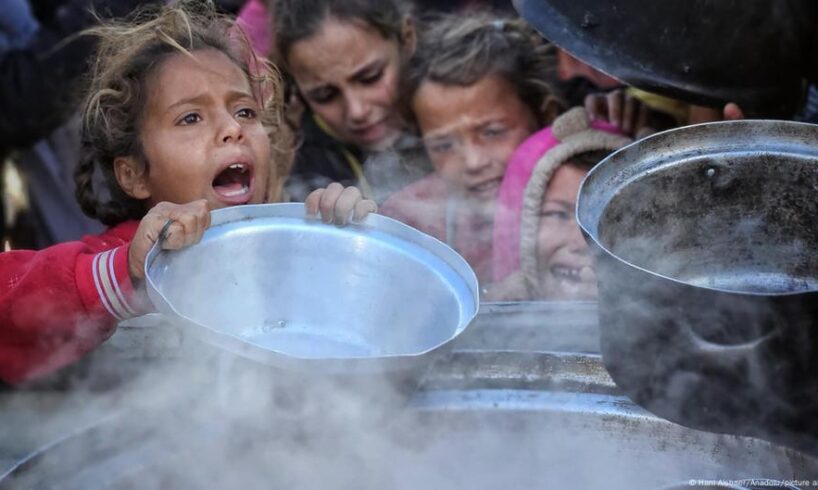
“One in 11 people worldwide are starving. Climate crisis, wars, inequality and reduced funding are also jeopardizing previous successes,” reads the 2024 report of the NGO Deutsche Welthungerhilfe(WHH) which was presented in Berlin on Thursday. The message sounds pessimistic, almost desperate.
Despite all the adversity, the private aid organization, which relies on government support and donations, is trying to spread confidence: “Our goal of a world without hunger remains achievable — if it is prioritized, politically willed and adequately funded,” the report states.
However, the NGO’s figures show an alarming trend: 733 million people worldwide currently suffer from chronic malnutrition. Since 2019, that number has risen by 152 million. And the situation is likely to worsen further because the US and Germany, the most important donor countries, are massively reducing their budgets for development cooperation and humanitarian aid.
“Cuts lead to loss of lives. What looks like austerity measures on paper means hunger, displacement or even death for millions of people,” WHH President Marlehn Thieme warned. She stressed that the elimination of hunger remains a top political priority, given the increase of wars and crises.
The Palestinian population in the Gaza Strip and the people of Sudan are particularly affected and increasingly unable to get assistance. The humanitarian situation in Gaza is one of the worst things he has seen in over 30 years, said WHH Secretary General Mathias Mogge.
Sudan: Half of the population needs humanitarian aid
The Sudanese army has been fighting the paramilitary group Rapid Support Forces since April 2023, displacing more than 11 million people within the country. According to the United Nations, around 25 million people in Sudan need humanitarian aid — about half of the population.
According to Mogge, working in Sudan is more dangerous than almost anywhere else. “We still have staff on the ground, some of whom have to hide in villages and the surrounding area,” he said.
Sudan is one of the places where the international response began too late, Mogge said self-critically. That is why WHH has established what it calls a proactive humanitarian aid system to enable them to respond faster to crises and wars, as well as to the consequences of climate change.
Mogge explained that this system enables them to make payments swiftly, “so that people don’t lose everything they own, such as livestock, money and agricultural equipment. Instead, they can keep as much as possible and don’t have to start from scratch later.”
War in Sudan — the forgotten crisis
To view this video please enable JavaScript, and consider upgrading to a web browser that supports HTML5 video
Syria: Nearly 15 million people are in need
Another hot spot for Welthungerhilfe is Syria, where the humanitarian situation remains catastrophic even after the Assad regime was ousted in December 2024. After 14 years of civil war, the economy is in ruins. There’s a shortage of everything: water, food, electricity, health services, schools.
Some 15 million people lack nutrition. At the end of last year, the price of bread in Aleppo rose by up to 900% within just one month, according to Welthungerhilfe’s annual report. The NGO began to support bakeries in the city to help feed 40,000 residents.
Almost €87 million in donations
Welthungerhilfe has projects in 37 countries, and cooperates with over 300 partners on the ground. Founded in 1962, the organization had a budget of around €384 million ($452 million) in 2024, of which just under €87 million came through donations.
With €147 million, the German Ministry for Economic Cooperation and Development is the biggest contributor to the Welthungerhilfe budget. The rest comes from international institutions, including the United Nations World Food Program and the European Commission.
How Germany’s cuts in foreign aid could cost lives
To view this video please enable JavaScript, and consider upgrading to a web browser that supports HTML5 video
A key sentence in the annual report reads: “Hunger and violent conflict are closely linked: without a secure food supply, peace remains difficult to achieve, and without peace, hunger can hardly be overcome.” Against this backdrop, Welthungerhilfe President Thieme urged the international community and the German government to step up diplomatic efforts to end conflicts.
While Germany is set to more than double its defense spending, the 2025 draft budget foresees a reduction of the foreign ministry’s humanitarian emergency aid to only €1 billion.
At the same time, spending on development cooperation will fall below the self-imposed target of 0.7% of GDP. Therefore, Welthungerhilfe together with the children’s aid organization Terre des Hommes have warned: “The German government is embarking not only on a financial but also a political departure from its international commitments.”
This article was originally written in German.
While you’re here: Every Tuesday, DW editors round up what is happening in German politics and society. You can sign up here for the weekly email newsletter, Berlin Briefing.





